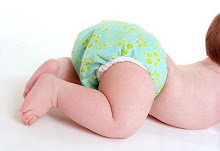 I'm pretty Crunchy.
I'm pretty Crunchy.Not totally Granola, but definitely on the crunchy side. I enjoy Natural Parenting and try to be environmentally responsible--(as I believe we should be good stewards of this earth that God created for us). I will say however, that convenience still rules sometimes in my house. If something is just not working for us- no matter how we've tried, I'm not going to stress myself too much over it. And if I don't see some benefit for me, I have a hard time staying motivated to do it. An example: If cloth diapering left Morris with roadrash on his buns, or it left me too frazzled of a mother to enjoy motherhood, I AIN'T DOIN IT! Are you with me on this?
So a few years ago a study came out claiming that cloth diapers were actually worse for the environment than disposables. They said that with all the energy used and water "wasted"--the environmental impact of using cloth diapers was greater than that of disposables. It also claimed that cloth was not healthy or sanitary for babies. Hmmm. Okay. So I thought to myself,
"Self-- These could be valid points. Let's look into it."
And so I did. Or we did. Why am I talking in 3rd person?
Anyway, I did a little research--and you know what I found?
This study was funded by Proctor & Gamble--a major manufacturer of disposable diapers.
That seems fishy to me.
I read the study further in which it said cloth diapers were worse for babies because they cause, "diaper rash and are unsanitary".
Again funded by Proctor & Gamble.
What's the truth?
First, I will address the health of the baby. That should always be first.
I found THIS article that addresses the issue so beautifully. Please read carefully. This is your baby's health we are talking about. Since reading this, I have found many other articles/studies from reliable sources that back it up...
"Although the disposable diaper industry spends millions of dollars on ad campaigns touting the fact that their diapers feel drier, there is no benefit to the baby in terms of diaper rash. In fact, diaper rash is caused by numerous factors ranging from food irritations to soaps used on the baby's skin, and the number one factor in preventing it is frequent diaper changes. For this reason, babies in disposable diapers may experience more diaper rash; because the diapers feel dry, parents tend to change them as infrequently as every four to five hours. But though the outer layer may appear dry, bacteria from the urine is still present in the baby's diaper, and still comes in contact with the baby's skin. Furthermore, plastic does not "breathe" to let out the ammonia formed in the bacterial breakdown of urine, while a cotton diaper and nylon or wool wrap are breathable, allowing air to circulate to the baby's skin, keeping it healthy.
Of more serious concern are the toxic chemicals present in disposable diapers. Dioxin, which in various forms has been shown to cause cancer, birth defects, liver damage, and skin diseases, is a by-product of the paper-bleaching process used in manufacturing disposable diapers, and trace quantities may exist in the diapers themselves.
And what about the material that makes "superabsorbent" diapers so absorbent? If you've ever used disposable diapers, you've probably noticed beads of clear gel on your baby's genitals after a diaper change. Superabsorbent diapers contain sodium polyacrylate, which absorbs up to 100 times its weight in water. Sodium polyacrylate is the same substance that was removed from tampons in 1985 because of its link to toxic shock syndrome. No studies have been done on the long-term effects of this chemical being in contact with a baby's reproductive organs 24 hours a day for upwards of two years. "
Of more serious concern are the toxic chemicals present in disposable diapers. Dioxin, which in various forms has been shown to cause cancer, birth defects, liver damage, and skin diseases, is a by-product of the paper-bleaching process used in manufacturing disposable diapers, and trace quantities may exist in the diapers themselves.
And what about the material that makes "superabsorbent" diapers so absorbent? If you've ever used disposable diapers, you've probably noticed beads of clear gel on your baby's genitals after a diaper change. Superabsorbent diapers contain sodium polyacrylate, which absorbs up to 100 times its weight in water. Sodium polyacrylate is the same substance that was removed from tampons in 1985 because of its link to toxic shock syndrome. No studies have been done on the long-term effects of this chemical being in contact with a baby's reproductive organs 24 hours a day for upwards of two years. "
I also read that in May 2000, the Archives of Disease in Childhood published research showing that scrotal temperature is increased in boys wearing disposable diapers, and that prolonged use of disposable diapers will blunt or completely abolish the physiological testicular cooling mechanism important for normal spermatogenesis.
Not to scare you...but that's scary! And to speak to the "Unsanitary" comment, I will quote
Janet Primomo, RN, PhD, associate professor of nursing at the University of Washington, Tacoma. She says "It's not a question of whether cloth or disposables are more sanitary--it all depends on practices and procedures, such as hand washing habits and what kind of storage containers are used."
Enough about that. If you are still not sold, there are plenty of studies you could Google to learn more. (Just make sure they aren't funded by Proctor and Gamble).
Now, on to the Enviornment.
If it is more environmentally responsible to use disposable diapers than cloth, why then are adults not using disposable underwear? Are we being selfish or spoiled by using cloth? How about disposable clothes? Why don't we just wear paper clothes everywhere?
You see where I'm going with this. Of course it's a ridiculous claim--and so is the idea that disposable diapers are better for the environment. If you need more convincing, read THIS article.
Alright--enough of all the Politics. Monday I will share a few more of the benefits that I and others have experienced through cloth diapering. Tuesday, we'll wrap this thing up and get you feeling ready to try it for yourself!
Stay tuned!
sources
-Nan Scott, "Nan Scott's Newsletter for Parents."
-EPA, "Integrated Risk Assessment for Dioxins and Furans from Chlorine Bleaching in Pulp and Paper Mills."
-Judy Braiman-Lipson, Empire State Consumer Association, Rochester, NY.
-Archives of Disease in Childhood. May 2000
Part 1 HERE-Exposing the Myths (sanitation)
Part 2 HERE- Exposing the Myths (ease of use)
Part 3 HERE- Exposing the Myths (cost)
Part 4 HERE- Cloth Diaper Benefits (health, environment)
Part 5 HERE- More Benefits (potty training, and more)
Part 6 HERE -Basic info and terminology
Part 7 HERE- Building your cloth diaper stash
Part 8 HERE- Diaper Needs Questionnaire
Part 2 HERE- Exposing the Myths (ease of use)
Part 3 HERE- Exposing the Myths (cost)
Part 4 HERE- Cloth Diaper Benefits (health, environment)
Part 5 HERE- More Benefits (potty training, and more)
Part 6 HERE -Basic info and terminology
Part 7 HERE- Building your cloth diaper stash
Part 8 HERE- Diaper Needs Questionnaire



























5 comments:
Emily, you have done an amazing job on your cloth diapering series. I have learned so much (and I thought I knew a lot about it already!) I find it funny (but surprisingly believable)that the disposable diaper companies are supporting these "studies." And GREAT point about us not using disposable underwear. ;) I feel that I have saved not only money, but worry. I remember one time I read that OUR countries disposable diapers wash up DAILY by the hundreds on beaches in other countries. The worst part? they don't even use disposables.
Beth-Thank you so much for reading. I'm glad you find value here.
I hope you don't mind me using a few more of your words on Monday's post: )
Funny. We purchased a hand-held bidet after Shyre was potty trained! Again, I am excited to use it for the next bum :) ... question: how does one dry off after using a bidet without using TP??
Tanya- great question. Most people still do use a small amount of TP to dry. Or, if you are in say the same Bathroom you shower in, you could use your own bath towel. I use a small handtowel for Mo that is a special color, so we know it's for his bum only--and this is in our Master so guests wouldn't confuse it with a handtowel. How do you do it? I can open that question up to everyone: )
I am not trying to dispute the idea that cloth diapers are better, but the thought occurred to me that there could be a huge difference in the environmental impact of cloth diapers versus the impact of cloth underware. The primary difference would be that while many of us don't mind waiting to wash our underware until there is a full load, most of us would want to wash pee and pooped soaked dipers immediately. Washing two or three diapers all by themselves in a big washing machine would use a lot more water and soap than washing a pair of underware in a full load, even if you used to the small load setting. That being said, I'm not ruling out cloth diapers.
Post a Comment